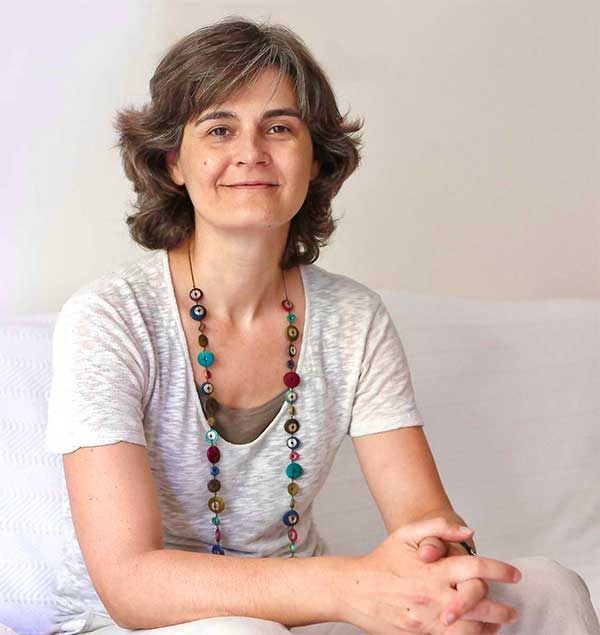About Irene Bakopoulou

Education and experience to date
I was born in Thessaloniki Greece, in 1972. I moved to the United Kingdom in 1996 where I began my career in the field of Mental Health with a BSc in Psychology and then an MA in Psychoanalytic Studies. In 2008 I further completed my training as a psychoanalytic psychotherapist for adults at the Arbours Association in London. During and after this training I worked for many years at the organisation’s mental health therapeutic communities, living among a diverse group of people with acute mental health difficulties. This hands-on experience was invaluable and continues to inform my work with individual therapy clients to this day.
During my 8 years in London, I also worked in other organisations, including befriending schemes, housing for people with mental health difficulties and others, working with a variety of mental health difficulties.
Starting in 2005, I worked privately as a psychoanalytic psychotherapist in North London and as an honorary psychotherapist for the UK National Health System (NHS) in the Halliwick department of Psychological Therapies at Saint Ann’s hospital.
Further training & development
Coming back to live in Greece I began to develop an interest in various psychotherapeutic models and what each had to offer. Since then I have trained in and studied the models that spoke to me and made the most sense.
I was very interested in loving relationships as a personal journey so I began with Terry Real’s Relational Life Therapy (RLT) and after completing the first level of the training, I have been following his work ever since. His simplicity and loving directness continues to inspire and inform my work as a therapist.
Next, I completed the first level of training in Emotionally Focused Therapy (EFT), by Susan Johnson, which I find to be an equally amazing way of working with couples. Although I don’t offer couples therapy, I have learned a great deal that I can bring to my work in individual therapy. After all, we are all in some kind of relationship and, as Esther Perel whose webinars I attended for a few years, says, “in couples therapy we do individual work and in individual work, we do couples therapy”.
I am also greatly interested in Dick Schwartz’s view of the human psyche. He developed a model that sees the internal world as made of parts that each have their own function, personality, ideas, attitudes and emotions, governed by the central Self. With his model Internal Family Systems (IFS), he provides a way to converse with these parts and to have them converse with each other, in an effort to get to know, understand and welcome these parts for what have bring to the table, thereby resolving issues in the process. In my view and experience, it’s a fascinating process that takes psychoanalytic practice a step further.
Finally, I am always amazed at the advances in neuropsychology and learning how the brain works. To this end, I have followed various online trainings with Jules Taylor Shore, who is gradually becoming one of the main psychotherapist trainers out there with insight into how this knowledge can help us therapists in our work.
The relational psychoanalytic psychotherapy model
The psychoanalytic psychotherapy that I offer is relational. I prefer the relational way of working because it differs from classical psychoanalysis in that it draws more on the relationship between the client and the psychotherapist and all that takes place within this relationship in the here and now. As a therapist, I view myself not as a white screen on which a client will freely write their narrative, unaffected by my presence, but as an active participant in the client’s psychotherapeutic journey. This makes sense to me, as I do not think it possible to  exclude the therapist’s input, conscious and unconscious, from the creation of this narrative, even if one wanted to.
exclude the therapist’s input, conscious and unconscious, from the creation of this narrative, even if one wanted to.
Effectively, you and I explore and write your narrative together in a way that feels true to you. The image of a person walking side by side with you, as a respectful and trustworthy companion in your journey, following your path and shedding light along the way, is closer to the way that I practice psychotherapy, than the classical image of a psychotherapist who sits behind you and out of your view, observing and interpreting your material. I deeply believe in the therapeutic value and strength of the psychoherapeutic relationship between therapist and client as it changes and develops across time through the therapy.
Field image by: Dan/FreeDigitalPhotos.net
Online
Psychotherapy

What can it help with?
How does it work?
What do I need for my online psychotherapy sessions and who will help me with any technical issues that arise?